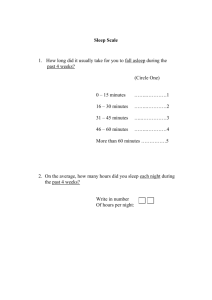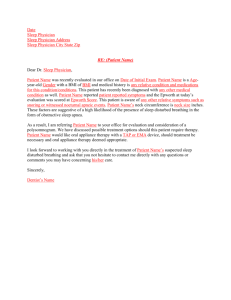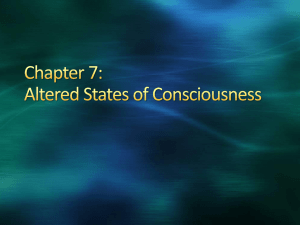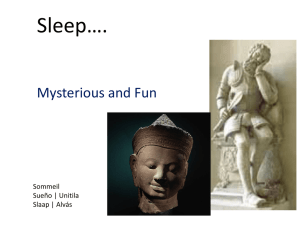Research paper draft 4
advertisement
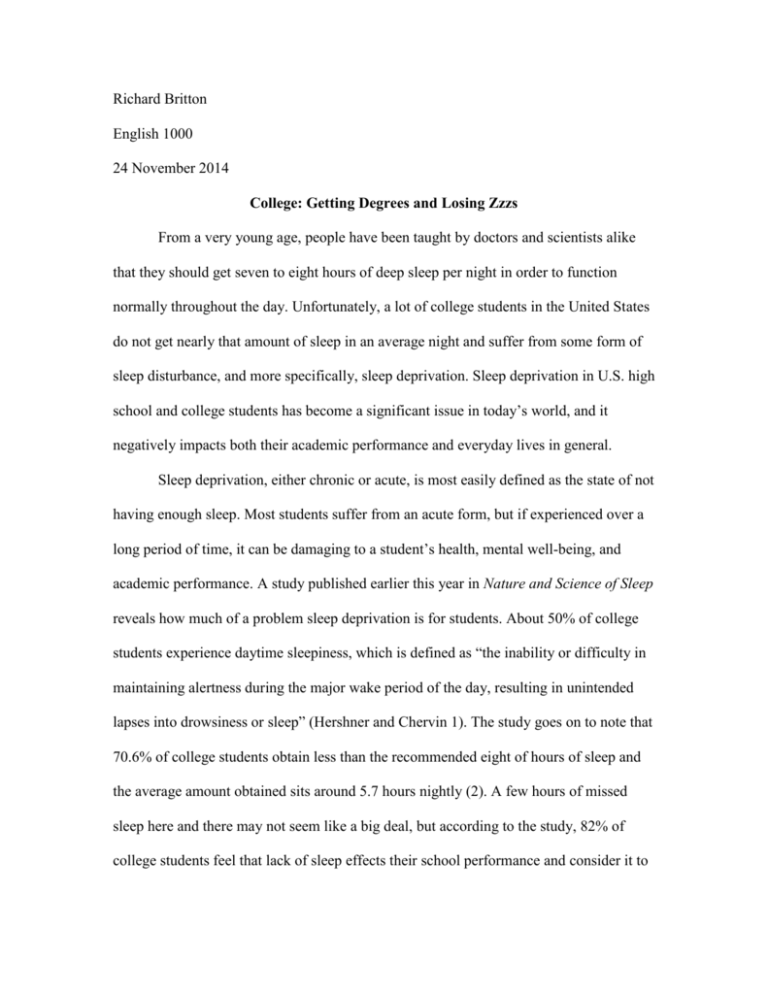
Richard Britton English 1000 24 November 2014 College: Getting Degrees and Losing Zzzs From a very young age, people have been taught by doctors and scientists alike that they should get seven to eight hours of deep sleep per night in order to function normally throughout the day. Unfortunately, a lot of college students in the United States do not get nearly that amount of sleep in an average night and suffer from some form of sleep disturbance, and more specifically, sleep deprivation. Sleep deprivation in U.S. high school and college students has become a significant issue in today’s world, and it negatively impacts both their academic performance and everyday lives in general. Sleep deprivation, either chronic or acute, is most easily defined as the state of not having enough sleep. Most students suffer from an acute form, but if experienced over a long period of time, it can be damaging to a student’s health, mental well-being, and academic performance. A study published earlier this year in Nature and Science of Sleep reveals how much of a problem sleep deprivation is for students. About 50% of college students experience daytime sleepiness, which is defined as “the inability or difficulty in maintaining alertness during the major wake period of the day, resulting in unintended lapses into drowsiness or sleep” (Hershner and Chervin 1). The study goes on to note that 70.6% of college students obtain less than the recommended eight of hours of sleep and the average amount obtained sits around 5.7 hours nightly (2). A few hours of missed sleep here and there may not seem like a big deal, but according to the study, 82% of college students feel that lack of sleep effects their school performance and consider it to have a negative impact on their academic success (2). When considering the amount of sleep college students should get compared to how much they actually get, the difference is concerning, especially when such strong correlations exist between scholastic failure and inadequate nightly sleep. While any given person is more than likely to have experienced daytime sleepiness in their lives, sleep deprivation can have significant impacts on the adolescent brain during the developing period. This can lead to severe health problems later in life. A study conducted in Canada by psychologist Reut Gruber looked at how sleep deprivation affected children in age groups ranging from infancy to late adolescence. Gruber states in her study that sleep deprivation occurs more often in all developmental stages than is commonly thought, and it can have serious developmental consequences (63). According to Gruber, it is pertinent to teach children regular sleep behaviors during their school-age years because during these years the brain is training its neural systems to begin the governing of self-regulation. Failure to develop a healthy sleeping pattern means it is very likely for a child to have long lasting, erratic sleep habits in their adolescence, after the maturation period of puberty occurs (67). Additional research has been done to show that sleep deprivation can have negative impacts on cognitive skills and processes like memory, learning, and daytime attentiveness. An inadequate amount of sleep can greatly reduce a student’s memory capacity as brain mapping has shown that the neural networks associated with memory “reactivate” themselves during sleep, this means that while a person is sleeping, their memory neurons are repairing themselves and preparing for a new day. Also, sleep deprivation has been proven to have a negative impact on a student’s neurobehavioral functions, including paying attention, problem solving, and alertness (63). In order to fully understand the possibly harmful effects of sleep deprivation on college students, one must understand the causes. Based on the personal interviews of college students that I have conducted, I have determined three main stressors in an average college student’s life that are possible causes of sleep deprivation. The first, and possibly the most impactful, cause comes from working a paid job coupled with overwhelming academic pressures such as homework and extracurricular activities. One college student and sufferer of sleep deprivation named Hannah that I interviewed said that on days she had both work and school, she was extremely tired throughout the day and usually had to take a nap between the two just to be able to function in class. “It also affects my relationships with other people and makes me cranky” said Hannah when I asked her how her sleep deprivation affected her daily life. For example, she does not like to socialize as much when sleep deprived and she tends to treat those she does socialize with in a harsh and mean manner (Dean). Schoolwork seems to be the most prevalent cause or sleep deprivation in the students I interviewed, and while students are sacrificing sleep to boost their GPA, the long-term effects could be harmful. Another noticeable contributor to the interviewees’ sleep deprivation is the social stresses that a typical college student is likely to encounter. For example, living in close proximity with other students, the demand to feel included in a social group, and finding a balance between personal relationships and schoolwork. One interviewee, Carrie, noted that on nights when she had every intention of going to sleep early, her dorm neighbors often keep her awake well into the night. “I’m tired more often, so I’m less likely to socialize. I will sometimes skip dinner with my friends because I’m too tired and end up going later by myself” (Storch). She also noticed that she was less likely to socialize on days when she was sleep deprived to due an increase in self-consciousness and tendency to ramble or form incoherent sentences. Lastly, I found that technology also plays a role in a college student’s nightly amount of sleep, especially considering that the current generation of college students has grown up with technology being easily accessible. With entertainment outlets like Netflix, Facebook, Tumblr, and numerous other social media sites being readily available, many college students are too distracted by their phone screens to go to sleep at a reasonable time. An interviewee named Jaycie said that along with schoolwork, technology is the main cause of her sleep deprivation. She mentioned that she often does not sleep until two or three o’clock in the morning because she “can’t put her phone down” (Loud). Out of all of my interviewees, she experienced the worst case of sleep deprivation and said that her severe lack of sleep often gives her headaches and a limited amount of energy during the day. While these stressors are certainly not true for every sleep deprived college student, they certainly help one understand why so many students experience sleep deprivation. While most effects of sleep deprivation are relatively short-term, it is possible for inadequate sleep repeated over a long period of time to have lasting psychological implications. Grogginess throughout the day is a minor consequence when considering that sleep deprivation has been linked with an increased risk for drug/alcohol abuse, anxiety, and depression. A study released in 2009 stated “adults aged 18-44 those who reported sleeping less than six hours per night were more likely to smoke and to have five or more drinks of alcohol in one day” (Vail-Smith. et al.). Some may consider these findings a “stretch” but one would be uninformed to deny there is not a correlation between the two. Furthermore, a separate study published in 2013 reported that college students suffering from insomnia have twice the amount of risk of developing depression or depression-like symptoms than students without a sleep disorder (Nyer et al. 874). The study also mentions that while the relationship between sleep deprivation and depression should be interpreted on a case-by-case basis, the two are very strongly linked and one can usually predict the other (875). Some of the aforementioned effects of sleep deprivation may vary from student to student, though it is hard to deny that college students across the nation are suffering from it in some form. With the greater amount of stress put on college students to succeed in the modern world, students are pushing themselves harder than any previous generation in terms of academia, and are usually sacrificing sleep to maintain a high GPA. They will stay up late to finish assignments, wake up early and sleep deprived for class, usually nap during the day, and stay up later to counteract the nap, then follow the same pattern the next day. This is a dangerous cycle that students fall into rather frequently and can be very difficult to break. Sleep deprivation poses a significant risk to academic success. College students rely heavily on their working and long-term memory to acquire new knowledge and preform well in school and according to neuroscientists, Pedr Fulke and Sior Vaughn, when sleep deprivation occurs prior to learning, a new memory is less likely to be acquired (Fulke and Vaughan 228). Also, studies show that 27% of students may suffer from at least one sleep disorder, which puts them at a higher risk for academic failure (Hershner and Chervin 6). While scientists and doctors may never be able to definitively declare a student’s sleep deprivation as a cause for illness or depression, a strong correlation will always exist between lack of sleep and negative behaviors. Unfortunately, reversing sleep deprivation entirely can be extremely difficult, although it can be managed and eventually controlled. It is apparent that sleep deprivation is a prevalent issue faced by many college students today and with increasing awareness of its harmful effects hopefully it will one day disappear completely from U.S. college students. Works Cited Dean, Hannah. Personal interview. 22 November 2014. Fulke, Pedr and Vaughan, Sior. “Neuroscience Research Progress: Sleep Deprivation: Causes, Effects and Treatment.” Nova Science Publishers Inc. (2009): 228. ProQuest. Web. 22 November 2014. Gruber, Reut. “Making Room for Sleep: The Relevance of Sleep to Psychology and the Rationale for Development of Preventative Sleep Education Programs for Children and Adolescents in the Community” Canadian Psychology (2013): 62-71. Academic Search Complete. Web. 21 Nov. 2014. Hershner, Shelley D. and Ronald D. Chervin. "Causes And Consequences of Sleepiness Among College Students." Nature & Science Of Sleep (2014): 73-84. Academic Search Complete. Web. 14 Nov. 2014. Loud, Jaycie. Personal interview. 22 November 2014. Nyer, Maren, et al. "Relationship Between Sleep Disturbance And Depression, Anxiety, and Functioning in College Students." Depression & Anxiety (1091-4269) 30.9 (2013): 873-880. Academic Search Complete. Web. 23 Nov. 2014. Storch, Carrie. Personal interview. 22 November 2014. Vail-Smith, Karen, W. Michael Felts, and Craig Becker. "Relationship Between Sleep Quality and Health Risk Behaviors in Undergraduate College Students." College Student Journal 43.3 (2009): 924-930. Academic Search Complete. Web. 23 Nov. 2014.


